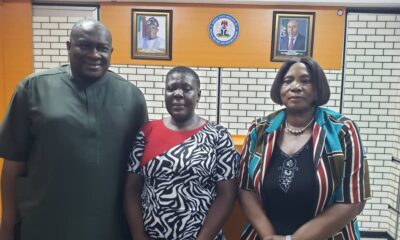Health
Hypertension And Natural Cures
Moderately high blood pressure or hypertension is symptomless and in itself not harmful. Healthy arteries can withstand extremely high pressure without damage. High blood pressure becomes dangerous when arteries are diseased and weakened.
The arteries have tough, muscular, elastic walls that relax and widen as the blood pulses through, then become slightly narrower between heartbeats.
Blood pressure is determined by the force of the blood as the heart pumps, multiplied by the amount of resistance that the arteries provide.
Blood pressure can rise for one or two reasons: Either the heart is working hard, causing an increase in the strength or rate of its pumping action and a corresponding increase in blood pressure or the walls of the arteries have become narrow, stiff or clogged with plaque, so the heart must pump hard to force blood through.
Hypertension is a serious condition that erodes artery linings, encouraging the build-up of plague, a condition called atherosclerosis and makes the arteries less resilient.
Left untreated, hypertension can lead to heart disease, heart failure, stroke, kidney damage, retinal damage, and a shortened life expectancy.
Hypertension kills because it has no obvious symptoms, at least in its early stages. As it becomes more severe, it may cause headaches, blurred vision, dizziness, nosebleeds and blackouts.
No one knows what brings on most cases of hypertension, although genetics are a likely contributor. Certain factors can hasten development of the condition, or make it worse. They include overweight, lack of exercise, poor diet stress, smoking, alcohol abuse, various hormones, and certain drugs.
Since hypertension cannot be cured, the standard treatments are designed to keep it under control. However it’s medical practice to bring about the reduction of blood pressure with drugs, but these produce undesirable side effects and really achieve nothing.
Over the years natural therapy advocates have believed and equally demonstrated that some herbs, including natural substance can help check high blood pressure.
According to Dr Ronald Hoffinan and Barry Fox, garlic is one natural herb that can go a long way to control high blood pressure. Studies have shown that garlic not only has powerful antibiotic properties but also can help treat high cholesterol and blood fats, arthritis, diarrhea and colds.
Commission E, the top German agency that regulates herbs approved the use of garlic for treatment for elevated blood pressure. The approval is backed by solid evidence in the use of the herb to control high bp.
Though there is no standard dose for garlic, typical supplemental doses may range from 600 to 1,200 milligrammes of extract or 300 mg of garlic powder daily.
On the other hand, there is a warning as excess garlic may cause dizziness, headache and irritation in the stomach. Prolonged use of garlic may lead to thinning of the blood and excess bleeding. Also, avoid using garlic with antidiabetic drugs, so as not to suffer from low blood sugar.
Health
‘How Micro RNA Research Won Nobel Prize’
Two United States scientists who unraveled the human micro RNA have won the Nobel Prize in Physiology or Medicine 2024.
Victor Ambros and Gary Ruvkun won the coveted prize for their work on microRNA as their discoveries help explain how complex life emerged on earth and how the human body is made up of a wide variety of different tissues.
MicroRNAs influence how genes – the instructions for life – are controlled inside organisms, including humans.
Every cell in the human body contains the same raw genetic information, locked in our DNA.
However, despite starting with the identical genetic information, the cells of the human body are wildly different in form and function.
The electrical impulses of nerve cells are distinct from the rhythmic beating of heart cells. The metabolic powerhouse that is a liver cell is distinct to a kidney cell, which filters urea out of the blood.
The light-sensing abilities of cells in the retina are different in skillset to white blood cells that produce antibodies to fight infection.
So much variety can arise from the same starting material because of gene expression.
The US scientists were the first to discover microRNAs and how they exerted control on how genes are expressed differently in different tissues.
The medicine and physiology prize winners are selected by the Nobel Assembly of Sweden’s Karolinska Institute.
They said: “Their groundbreaking discovery revealed a completely new principle of gene regulation that turned out to be essential for multicellular organisms, including humans.
“It is now known that the human genome codes for over 1,000 microRNAs.”
Health
WHO Begins Regulation On Antibiotic Waste
The World Health Organisation (WHO) has begun acting to curb effects of antibiotic pollution.
The new guidance on wastewater and solid waste management for antibiotic manufacturing sheds light on this important but neglected challenge ahead of the United Nations General Assembly (UNGA) High-Level Meeting on antimicrobial resistance (AMR) taking place on 26 September 2024.
The emergence and spread of AMR caused by antibiotic pollution could undermine the effectiveness of antibiotics globally, including the medicines produced at the manufacturing sites responsible for the pollution.
Despite high antibiotic pollution levels being widely documented, the issue is largely unregulated and quality assurance criteria typically do not address environmental emissions. In addition, once distributed, there is a lack of information provided to consumers on how to dispose of antibiotics when they are not used, for example, when they expire or when a course is finished but there is still antibiotic left over.
“Pharmaceutical waste from antibiotic manufacturing can facilitate the emergence of new drug-resistant bacteria, which can spread globally and threaten our health. Controlling pollution from antibiotic production contributes to keeping these life-saving medicines effective for everyone,” said Dr Yukiko Nakatani, WHO Assistant Director-General for AMR ad interim.
Globally, there is a lack of accessible information on the environmental damage caused by manufacturing of medicines.
“The guidance provides an independent and impartial scientific basis for regulators, procurers, inspectors, and industry themselves to include robust antibiotic pollution control in their standards,” said Dr Maria Neira, Director, Department of Environment, Climate Change and Health, WHO. “Critically, the strong focus on transparency will equip buyers, investors and the general public to make decisions that account for manufacturers’ efforts to control antibiotic pollution.”
Health
Kebbi Harmonises Doctors’ Salaries To Curb Brain Drain
In a concerted effort to curb brain drain, the Kebbi State Government has harmonised medical doctors’ salaries to be at par with their colleagues in the federal government’s tertiary health facilities.
Kebbi State Commissioner for Health, Musa Inusa-Isma’il, disclosed this at the handing over of ambulances to the state-owned health facilities at the Ministry of Health in Birnin Kebbi yesterday.
Inusa Isma’il, according to a statement by Ahmed Idris, the Chief Press Secretary to the governor, said the essence of the harmonisation was to retain the existing medical doctors and attract more to the services of the state.
According to him, the doctors across the state had already started enjoying the new salaries from August 2024.
He said the release of the vehicles was in fulfilment of Governor Nasir Idris’ promise to uplift health care services in the state.
“His Excellency said I should inform you, the beneficiaries of this gesture, that the vehicle should be strictly used for the intended purpose. It should not be used for anything else.
“If there is no referral case, each of the vehicles must be parked at the hospital by 6 pm. The governor said you should warn your drivers against reckless driving as well as violating the instructions.
“We should also do everything possible to reciprocate the gesture by working according to the terms and conditions attached,” he advised.
The benefiting health facilities included Sir Yahaya Memorial Hospital, Birnin Kebbi; State Teaching Hospital, Kalgo; General Hospital, Argungu; General Hospital, Yauri; General Hospital, Zuru; and General Hospital, Bunza.
In his speech, the permanent secretary of the ministry, Dr Shehu Koko, recalled that the ambulances were handed over to the ministry last Friday by the governor for the onward handover to the benefiting hospitals.
He observed that the ambulances would go a long way in improving the referral system in the state, adding that delays in reaching the secondary and tertiary facilities would be eliminated.
The permanent secretary attributed the high rate of maternal mortality in the country to delays in getting to the health facilities for proper medical care.
“We believe with the provision of these ambulances, part of the gaps we have in our referral system will be addressed, whereby patients who require secondary healthcare could be easily transported to secondary and tertiary health centres, where they can get such help,” he said.
In a goodwill message, Commissioner for Information and Culture Alhaji Yakubu Ahmed expressed gratitude to the governor for the support he has given to the ministry to excel.
While advising the beneficiaries to use the vehicles judiciously, the commissioner advised that services and maintenance of the vehicles must be prompt to derive the maximum benefits from the vehicles.
The commissioner also highlighted some achievements recorded by the government in the last year, including beautification of the state capital, completion of a multimillion-naira ultramodern state secretariat, road construction, construction and renovation of classrooms and upgrading of some health facilities, among others.
-
Business2 days ago
NDYC Seeks NDDC Commercialisation … Uncompleted Projects Completion
-

 Rivers2 days ago
Rivers2 days agoCommissioner Promises Improved Working Conditions … Splashes N.1m On Outstanding Caregiver
-
Sports2 days ago
Sports: 2nd Edition Of Inter-Tribal Tourney Kick-starts In Mbiama
-
Niger Delta2 days ago
NACAT Inaugurates South-South Office In A’Ibom Against Corruption
-
Sports2 days ago
AFCON: Eguavoen, Emenike predict S’ Eagles’ chances
-
Business2 days ago
Bayelsa Recommits To Infrastructure, Sectoral Dev … Rakes In N227.185b From IGR
-

 News2 days ago
News2 days agoS’South Deputy Govs Pay Condolence Visit To A’Ibom Colleague
-

 Niger Delta2 days ago
Niger Delta2 days agoHYPREP Presents Scholarship Grants To 300 Ogoni Postgraduate Students

